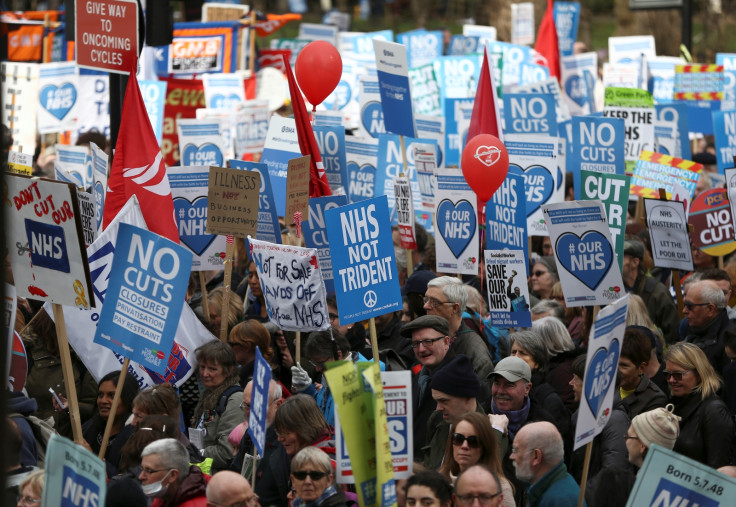Society is hooked on healthcare spending — but more money doesn't make people healthier
From America's opioid crisis to the NHS's instinct to over-medicalise, healthcare spending is often wasteful.

In the wake of news that 'Trumpcare' is back on the political agenda, it seems like a good time to examine the effects of Obamacare and the expansion of health insurance associated with it.
This column has previously advanced the theory that modern Western populations are over-medicated and suffer accordingly, both financially and physically. While the overwrought reaction of outraged doctors on Twitter continues, recent evidence continues to add more fuel to the fire.
A new paper from economists Charles Courtemanche et al examines the post-2014 effects of the Affordable Care Act (ACA). Predictably enough, they find large expansions in healthcare access across the board, particularly in those states that concurrently expanded access to Medicaid. The actual improvements in self-rated health, however, appear to be zero or very close to zero.
Admittedly, self-rated health is a fairly mediocre proxy for actual health. It will take a few years more for the data to emerge on the medium-term effects of the ACA on objectively measured health. On the basis of existing data, however, I can confidently predict that the net effect on population health will be slightly negative or zero.
The case is further bolstered by another recent paper from Harvard's own Yusuke Tsugawa and others, who find, across a vast sample of physicians, patients, and hospitalisations, no beneficial effects of higher spending by physicians on Medicare patients, even when comparing physicians working within the same hospital.
This finding is not due to a lack of between-physician variation in spending; the authors find large between-physician variation, quite comparable to between-hospital variation. Again and again the literature concurs; more healthcare spending does not make people healthier.
Can it make people sicker? To answer this question, Twitter's own notorious and mysterious "Spotted Toad" steps into the breach, arguing that more healthcare access has fuelled America's tragic opioid addiction crisis.
On his blog, he makes a persuasive case that the policy drive to expand health insurance coverage, especially to young people, lead to a divergence in overdose rates between states that accepted the Medicaid expansion and those that did not, with higher OD rates in the pro-Medicaid states.
The mechanism is explained by Sam Quinones in his recent book, Dreamland, where he outlines how a combination of cheap healthcare (Medicaid) and permissive doctor attitudes to opioid prescription flooded the streets with Oxycontin, creating a generation of addicts who later turned to heroin as the supply of prescription pills eventually tightened and their addictions deepened. Toad's evidence is spread over multiple posts, all of which are worth reading.
In an interview, Toad told me he also regards the ease of trafficking cheap heroin across the US border with Mexico as a further contributory factor to the crisis. President Trump's long-standing desire to secure the border, therefore, may fit well with a clear public health imperative.
Here and there, the doctors who ran infamous "pill mills" are facing prosecution. Trump and his Attorney General, Jeff Sessions, would perhaps also be well advised to agitate for prosecutions of some prominent Big Pharma executives involved in the manufacturing and advertising of the most dangerous drugs (similar to the Purdue Pharma prosecutions of a decade ago). Finding appropriate scapegoats is likely to be a popular move.
More broadly, the opioid crisis itself may well have its roots in over-medicalisation, irrespective of any particular policy decisions. American doctors have viewed the rise in midlife chronic pain, alcoholism and general sickness as primarily a medical problem, and responded accordingly by liberal prescription of strong pain medication. This has not exactly had stellar results.
In reality, complex issues of community and family breakdown, de-industrialisation, labour market insecurity,and decaying moral and social norms are not medical problems and their effects should not – mostly – be treated as such. Our soma equivalents are no match for spiritual death.
Here in the UK, excessive veneration of medical professionals, and a similar instinct to over-medicalise broader social problems, are having more subtle but equally corrosive effects. No rational debate over the future of the NHS can take place without an acknowledgement of the vast wastefulness of our current levels of spending.
Scandals like Mid Staffs fester because of a culture that clamps down on whistleblowers, unable to acknowledge that not all healthcare workers are angels. The British Medical Association, a cartel that colludes with the government to limit the supply of native-born doctors (despite vast demand for more medical school places), retains widespread public support.
The endless outcry for more NHS spending is supported only by a great deal of emotion. I very much doubt it can be merited by the facts.
© Copyright IBTimes 2025. All rights reserved.






















